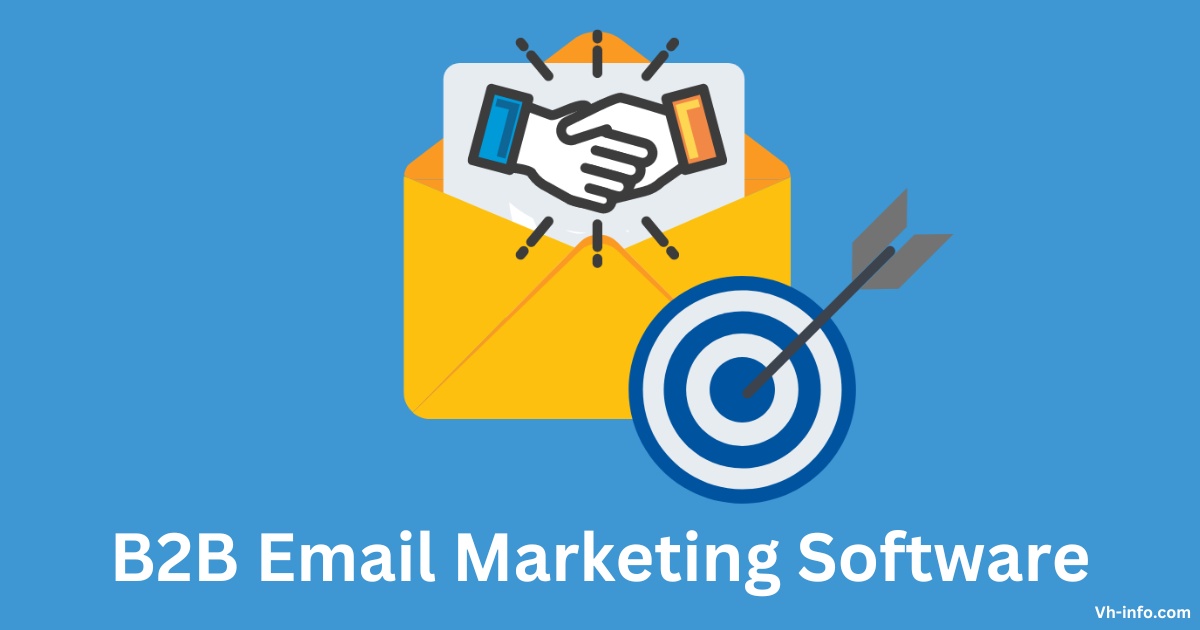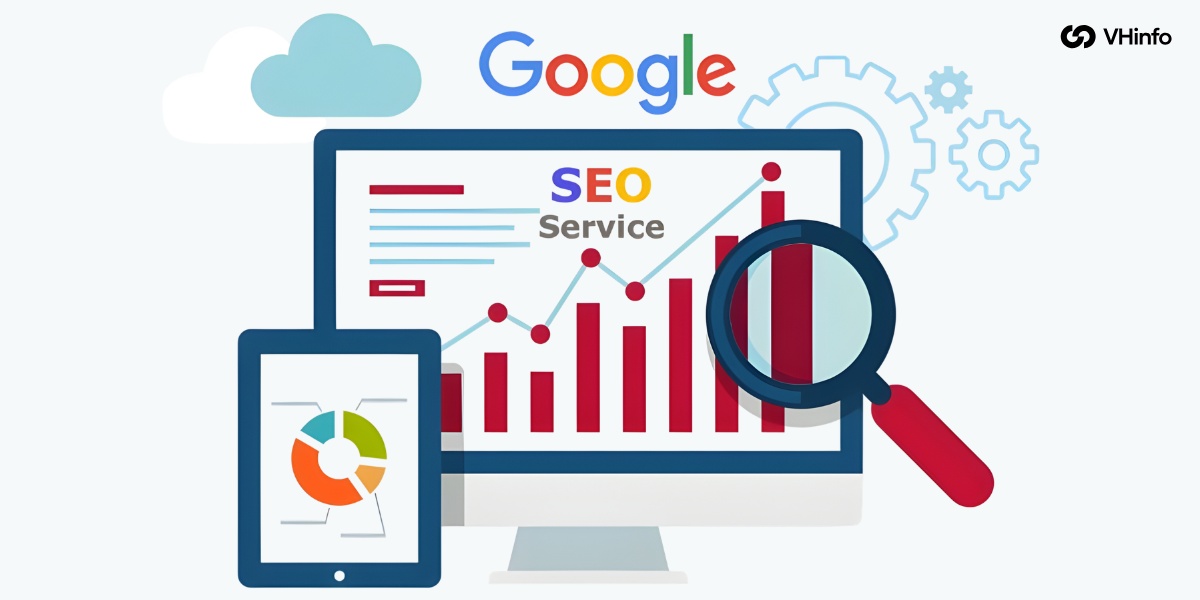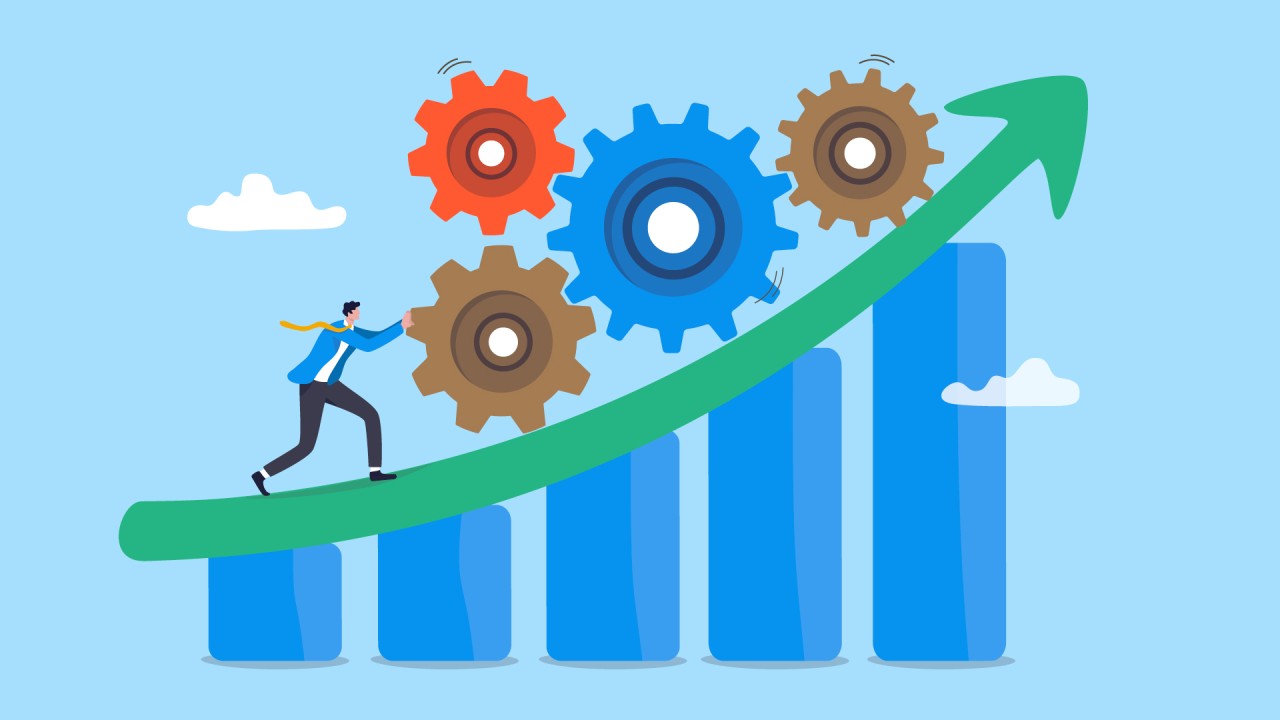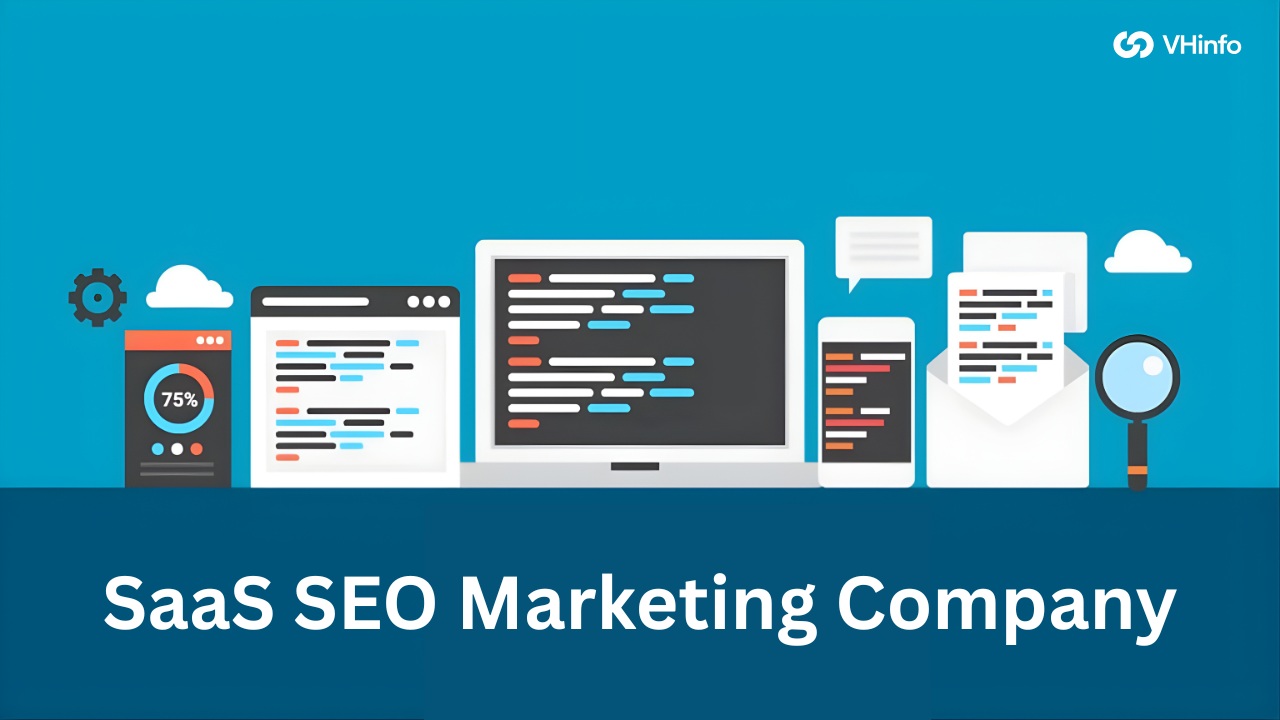In today’s competitive digital landscape, email marketing remains a cornerstone of successful marketing efforts, especially for B2B businesses. To execute effective marketing campaigns, businesses need the right marketing software.
This guide from VH-info dives deep into the world of B2B email marketing software, providing actionable insights to help you choose the best marketing tool for lead generation and nurture your customer journey.
What is B2B Email Marketing Software?

B2B email marketing software is a specialized marketing platform designed to facilitate email marketing strategies specifically for businesses targeting other businesses.
Unlike B2C email marketing, which focuses on direct sales to individual consumers, B2B email marketing emphasizes building relationships, providing value, and nurturing leads through targeted email content.
These platforms offer automation tools, email templates, and advanced features to streamline marketing automation and improve campaign performance.
Why is Email Marketing Important For B2B Businesses?

Email marketing is vital for B2B businesses, including a mobile app development company, for several reasons. It allows for direct communication with your target audience, enabling personalized messaging that resonates with their specific needs and pain points.
Effective email marketing campaigns can drive new subscribers, nurture leads, and convert prospects into loyal customers.
Moreover, email marketing provides a cost-effective way to distribute valuable content, establish thought leadership, and drive traffic to your website.
Key Features of B2B Email Marketing Software

The key features of B2B email marketing software are designed to optimize your marketing efforts and enhance your campaign performance.
- Automation and Workflow Management: Automation features are at the heart of efficient email marketing. They allow you to create automated workflows that trigger drip campaigns based on specific actions or behaviors of your target audience. This ensures that the right message reaches the right person at the right time, maximizing engagement and conversion rates.
- Audience Segmentation and Personalization: Audience segmentation is another essential feature, enabling you to divide your target audience into smaller, more defined groups based on demographics, industry, job title, or engagement level. This customer data allows for highly personalized email content that speaks directly to the needs and interests of each segment.
- Analytics and Reporting Tools: Comprehensive analytics and reporting tools provide valuable insights into the performance of your marketing campaigns. You can track open rates, click-through rates, conversion rates, and other key metrics to measure the effectiveness of your email marketing strategies and identify areas for improvement. Integrating with google analytics can provide even deeper insights.
- Integration With Other Platforms: The ability to integrate with other platforms, such as customer relationship management (CRM) systems, social media marketing platforms, and live chat tools, is important for a seamless customer journey. These integrations allow you to synchronize customer data, automate tasks, and deliver a more consistent and personalized experience across all touchpoints.
- Scalability and Pricing Considerations: As your business grows, your email marketing needs will evolve. Choose a marketing solution that offers scalability to accommodate your increasing contact list and evolving requirements. Consider the pricing structure of different platforms, and look for a paid plan that aligns with your budget and offers the range of features you need. Some platforms offer a free version or free trial to help you get started.
Benefits Of Using B2B Email Marketing Software

Implementing the best b2b email marketing software offers several tangible benefits for B2B businesses.
- Enhanced Lead Nurturing: Email marketing software facilitates enhanced lead nurturing by allowing you to create targeted drip campaigns that guide prospects through the sales funnel. Email marketing software facilitates enhanced lead nurturing by allowing you to create targeted drip campaigns using effective sales email templates that guide prospects through the sales funnel. By delivering relevant and valuable email content at each stage, you can build trust, establish credibility, and increase the likelihood of conversion.
- Improved ROI and Conversion Rates: By optimizing your marketing campaigns with the right marketing features, you can significantly improve your return on investment (ROI) and conversion rates. Personalized messaging, automation tools, and detailed analytics enable you to refine your strategies, target the most receptive segments of your target audience, and drive more qualified leads.
- Streamlined Campaign Management: Email marketing software streamlines campaign performance by centralizing all your marketing automation efforts into a single, user-friendly interface. From creating email templates to scheduling sends and tracking results, these platforms simplify the entire email campaign process, saving you time and resources.
Top B2B Email Marketing Software in 2025

In 2025, several email marketing platforms have emerged as leaders in the B2B space, each offering unique features and capabilities that cater to various business needs.
Here’s a closer look at these top B2B email marketing software options:
HubSpot

HubSpot is a comprehensive all-in-one marketing platform that integrates CRM capabilities with powerful email marketing tools.
It allows B2B marketers to automate their workflows effectively, nurturing leads through tailored email sequences that guide prospects from awareness to decision-making.
HubSpot’s features include advanced audience segmentation, enabling personalized messaging based on user behavior and demographics.
With its user-friendly drag-and-drop email builder, businesses can create visually appealing emails without technical expertise.
HubSpot also offers robust analytics to track campaign performance and optimize strategies over time. While it provides a free plan for up to 2,000 emails per month, premium plans start at $15/month, making it suitable for both small and large businesses.
Mailchimp

Mailchimp is well-known for its user-friendly interface and extensive library of customizable email templates. It caters primarily to small and mid-sized teams looking to launch creative email marketing campaigns quickly.
With its automation features, Mailchimp allows users to set up targeted drip campaigns based on subscriber behavior, enhancing engagement and conversion rates. The platform also offers A/B testing capabilities, enabling marketers to optimize their emails for better results.
Mailchimp’s free plan allows sending up to 1,000 emails per month, making it an attractive option for startups and small businesses looking to establish their email marketing efforts without significant upfront costs.
Brevo

Brevo (formerly Sendinblue) is an affordable email marketing solution that combines email with SMS marketing and CRM features. This platform is ideal for businesses seeking a unified communication tool that covers multiple channels.
Brevo offers powerful automation tools for lead nurturing and customer engagement, allowing businesses to set up follow-ups and reminders effortlessly.
Its free plan includes up to 300 emails per day with unlimited contact storage, making it accessible for small businesses. Brevo’s drag-and-drop editor simplifies the email creation process, while its predictive sending feature optimizes delivery times for higher open rates.
Klaviyo

Klaviyo is particularly favored by e-commerce businesses due to its strong integration capabilities with platforms like Shopify and WooCommerce. This email marketing software excels in using customer data for highly targeted campaigns.
Klaviyo’s advanced segmentation allows marketers to tailor messages based on detailed customer behaviors, ensuring relevance and engagement. The platform also supports automated workflows that react dynamically to customer interactions, enhancing the overall customer experience.
Although it may be pricier than some alternatives, Klaviyo’s data-driven approach can significantly improve conversion rates for B2B companies focused on e-commerce. However, due to its high cost and complexity, many businesses find it beneficial to evaluate the best Klaviyo alternatives to ensure they are using a platform that offers the best value and the right features for their specific needs.
ActiveCampaign
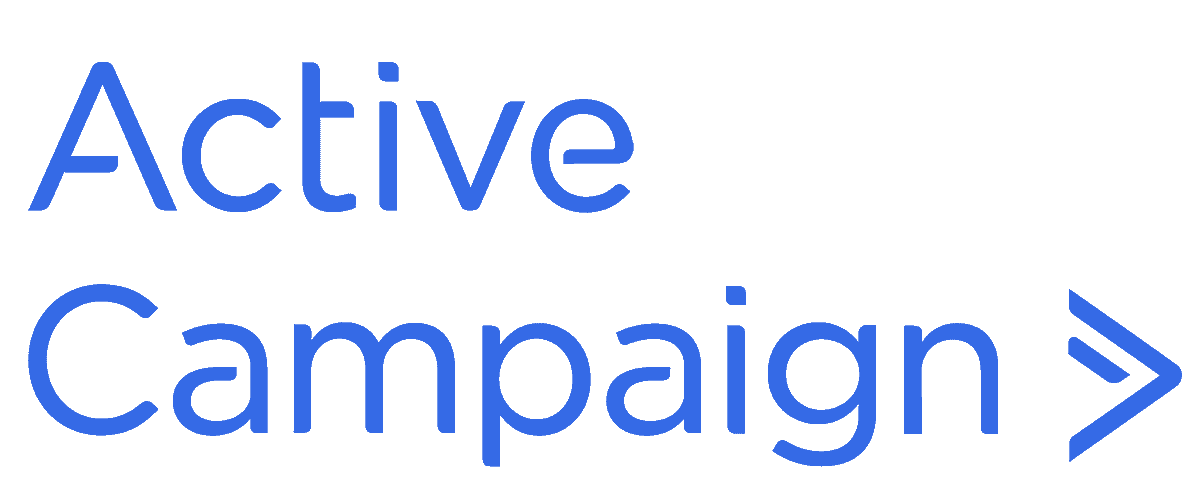
ActiveCampaign is a robust marketing automation platform that combines email marketing, CRM functionalities, and sales automation tools. Its advanced automation capabilities allow users to create complex workflows tailored to different customer journeys.
ActiveCampaign also provides detailed analytics and reporting tools, helping businesses measure the effectiveness of their campaigns accurately.
The platform’s audience segmentation features enable personalized messaging that resonates with specific segments of the target audience.
With plans starting at $9/month, ActiveCampaign is an excellent choice for B2B businesses looking to enhance their lead generation efforts through effective email strategies.
Zoho Corporation

Zoho Corporation offers a suite of business applications, including Zoho Campaigns for email marketing. This platform provides a range of features designed for B2B marketers, such as customizable templates, automation tools, and detailed analytics.
Zoho’s integration with other Zoho products allows for seamless data management across various business functions. The platform supports audience segmentation and personalized messaging, making it easier for businesses to engage their target audience effectively.
With competitive pricing starting from $10/month, Zoho Campaigns is suitable for small to mid-sized B2B companies looking for an integrated solution.
GetResponse

GetResponse is a versatile email marketing platform that offers a variety of features including webinar hosting and landing page creation alongside traditional email services.
This makes it particularly useful for B2B businesses aiming to strengthen their online presence and nurture customer relationships effectively.
GetResponse provides automation tools that help streamline campaign management while offering detailed analytics to track performance metrics like open rates and click-through rates.
With a free plan allowing up to 2,500 emails per month, GetResponse is an excellent option for businesses looking to expand their email marketing efforts without significant investment.
Marketo

Marketo stands out as a powerful marketing automation platform designed specifically for enterprise-level B2B companies. It offers advanced features such as lead scoring, predictive analytics, and extensive integration options with other business tools.
Marketo’s robust segmentation capabilities allow marketers to deliver highly personalized content tailored to individual customer journeys. The platform excels in managing complex campaigns across multiple channels while providing comprehensive analytics to measure ROI effectively.
While Marketo’s pricing can be on the higher side compared to other options, its extensive feature set makes it ideal for larger organizations with sophisticated marketing needs.
Convertkit
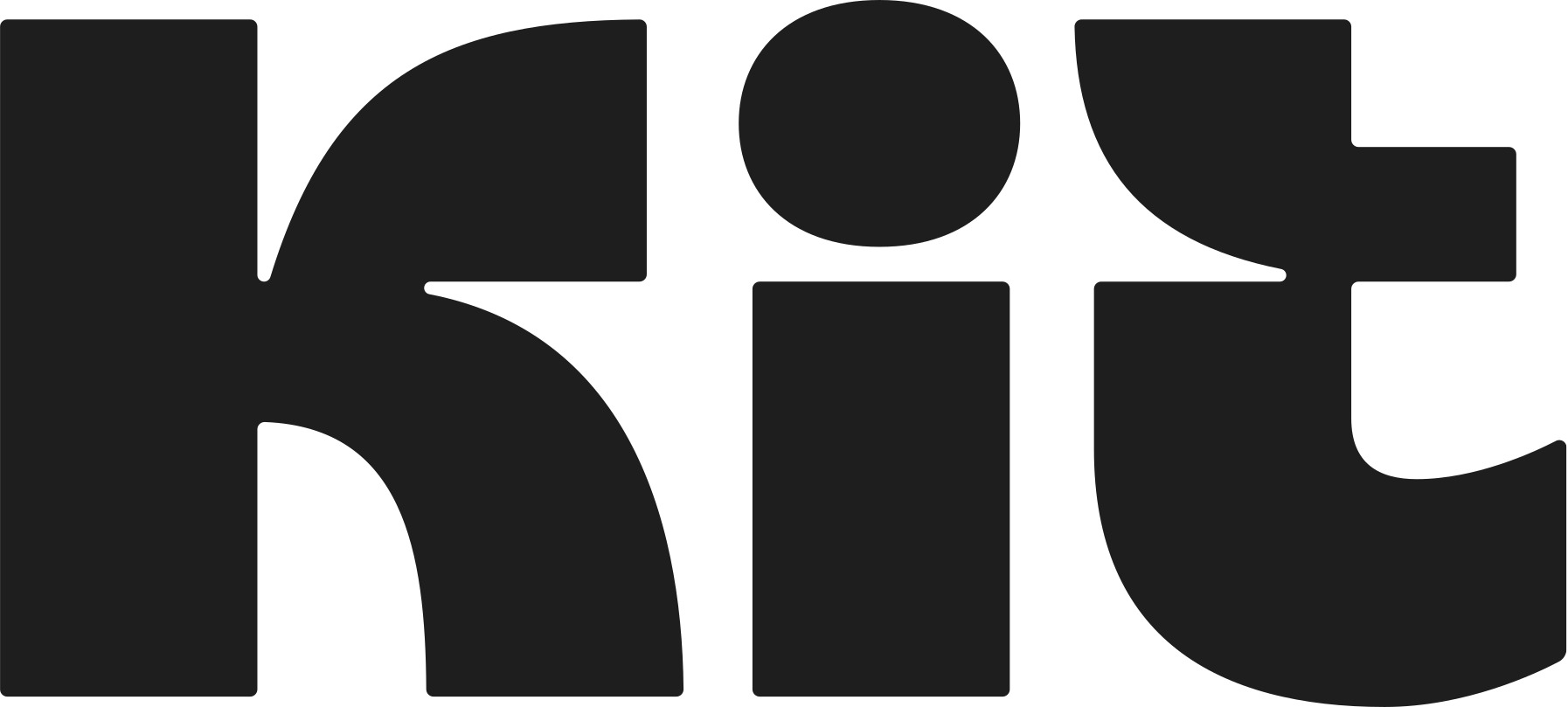
ConvertKit is an intuitive email marketing tool designed primarily for creators but also serves B2B marketers well due to its simplicity and effectiveness in building targeted campaigns.
It provides easy-to-use automation features that allow users to create drip campaigns based on subscriber actions or interests.
ConvertKit emphasizes audience segmentation and personalization, enabling marketers to tailor their messages effectively.
The platform also supports customizable landing pages and forms that help capture leads seamlessly. With pricing starting at $15/month after a free trial period, ConvertKit is suitable for small businesses looking for an easy-to-use solution.
Omnisend

Omnisend is an all-in-one email marketing solution tailored specifically for e-commerce but also applicable in the B2B space due to its multichannel capabilities including SMS and push notifications.
It offers robust automation tools designed to enhance customer engagement through personalized messaging across different platforms.
Omnisend’s integration with e-commerce platforms allows users to use purchase data for targeted campaigns effectively.
The platform also provides A/B testing features and detailed analytics that help optimize campaign performance over time. With plans starting at $16/month after a free trial period, Omnisend is well-suited for B2B companies looking to enhance their digital marketing strategies.
These platforms represent some of the best options available in 2025 for B2B email marketing software, each offering unique features tailored to meet diverse business needs in the ever-evolving digital landscape.
How To Choose The Best B2B Email Marketing Software For Your Business?

Choosing the best b2b email marketing software for your business is a critical decision that can significantly impact your marketing efforts.
Here’s how to approach it:
Assessing Your Business Needs
Begin by thoroughly evaluating what your business requires from an email marketing platform.
What are your specific goals? Are you primarily focused on lead generation, nurturing existing leads, or driving sales? Determine the scale of your marketing campaigns and the number of contacts you need to manage.
Consider essential key features like automation tools, audience segmentation, and integration with your CRM or other marketing tools. Understanding these needs will narrow down your options and help you find a marketing solution that aligns with your objectives.
Evaluating Software Usability and Support
The ease of use of the email marketing software is vital for your team’s productivity. Look for a platform with an intuitive interface, a drop editor, and readily available email templates to simplify email content creation. Also, consider the quality of customer support.
Does the vendor offer comprehensive documentation, tutorials, and responsive customer service? Reliable support is important for troubleshooting issues and maximizing the value of your marketing automation platform.
A free trial can help you assess the software’s usability and the responsiveness of the support team before committing to a paid plan.
Best Practices For B2B Email Marketing Campaigns

To maximize the effectiveness of your B2B email marketing campaigns, follow these best practices.
- Creating Effective Subject Lines and Headers: Your subject line is the first thing your target audience sees, so it’s essential to make it compelling and relevant. Use clear, concise language that accurately reflects the content of your email content. A/B b testing different subject line options to see what performs best.
- Personalization Strategies For Better Engagement: Personalization strategies are key features to better open rates and engagement by tailoring your messaging to the specific needs and interests of each recipient. Use audience segmentation to deliver highly targeted content that resonates with each segment of your target audience.
- Timing and Frequency of Emails: Consider the timing and frequency of your emails. Send emails at optimal times when your target audience is most likely to engage with them. Avoid overwhelming new subscribers with too many emails too soon.
FAQ’s:
What Is The Difference Between B2C and B2B Email Marketing Software?
B2C (business-to-consumer) email marketing software often focuses on direct sales to individual consumers, emphasizing promotional offers and immediate purchases.
In contrast, B2B (business-to-business) email marketing software prioritizes building relationships and nurturing leads within organizations.
B2B platforms typically offer more robust audience segmentation, marketing automation, and lead generation tools to cater to longer sales cycles and complex decision-making processes.
Can I Integrate Email Marketing Software With My CRM?
Yes, integrating your email marketing software with your customer relationship management (CRM) system is highly recommended. This integration allows you to synchronize customer data, streamline marketing automation, and gain a holistic view of your customer journey.
By connecting these platforms, you can personalize email campaigns, track customer interactions, and improve overall campaign performance, ultimately enhancing your marketing efforts.
How Will AI Influence B2B Email Marketing Strategies?
Artificial intelligence (AI) is set to transform B2B email marketing strategies by enabling more personalized and efficient campaigns.
AI can analyze vast amounts of customer data to predict behavior, optimize subject lines, and personalize email content. AI-powered automation features can also automate tasks like audience segmentation and b testing, allowing email marketers to focus on strategic initiatives.
Can Email Marketing Software Improve Customer Retention Rates?
Yes, email marketing software can significantly improve customer retention rates by enabling ongoing engagement and personalized communication. Through targeted email campaigns, you can provide valuable content, product updates, and exclusive offers to existing customers.
By nurturing these relationships, you can increase customer loyalty, reduce churn, and encourage repeat business, ultimately boosting your long-term revenue.
Conclusion
Choosing the best b2b email marketing software is a significant decision that can have a profound impact on your marketing efforts.
By understanding your business needs, evaluating the range of features offered by different platforms, and following best practices for email marketing campaigns, you can find a marketing solution that helps you achieve your lead generation goals and drive sustainable growth.
VH-info hopes this guide will steer your marketing strategies toward success.
